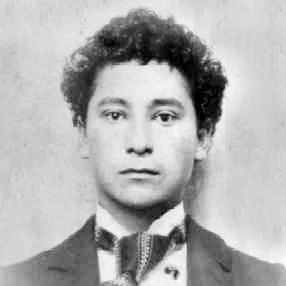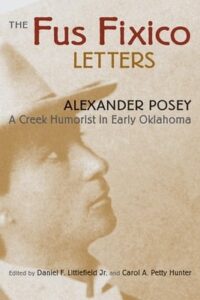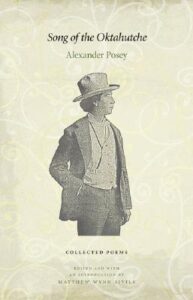Alexander Posey
The Dew and the Bird
In a poem of strict rhymes and old forms, Alexander Posey (1873-1908), a poet of the Creek Nation, poses challenges to pomposity.
We’re pleased to offer Alexander Posey’s poem, and invite you to connect with Poetry Unbound throughout this season.

Image by Annisa Hale/ Film processed by Moody's Film Lab, © All Rights Reserved.
Guest

Alexander Posey was a poet, editor, and satirist born in 1873 in the Creek Nation. Posey was the publisher of the first Indian-published daily newspaper, the Eufaula Indian Journal.
Transcript
Transcription by Alletta Cooper
[music: “Praise the Rain” by Gautam Srikishan]
Pádraig Ó Tuama: My name is Pádraig Ó Tuama and a few years ago, a friend of mine, Marie Howe, said to me, “Nobody will read our poems after we die.” And I think people will read hers after she dies. I’m pretty sure they will. But one of the things I thought was brilliant about what she said is, we write as evidence of being alive. We write as a way of being alive — to attune us to our lives — rather than some imagination of eternal life through our writing. That writing has a purpose of paying attention to the world, rather than thinking it’ll survive my own life.
“The Dew and the Bird” by Alexander Posey
“There is more glory in a drop of dew,
That shineth only for an hour,
Than there is in the pomp of earth’s great Kings
Within the noonday of their power.
“There is more sweetness in a single strain
That falleth from a wild bird’s throat,
At random in the lonely forest’s depths,
Than there’s in all the songs that bards e’er wrote.
“Yet men, for aye, rememb’ring Caesar’s name,
Forget the glory in the dew,
And, praising Homer’s epic, let the lark’s
Song fall unheeded from the blue.”
[music: “Into the Earth” by Gautam Srikishan]
I don’t always think you need to know a huge amount about the poet in order to be able to understand the poem. But in this case, with this poem by Alexander Posey, I think it’s really rewarding to know something about who the poet is, especially when you look at the elevated language of “The Dew and the Bird.” You know, lines like: “That shineth only for an hour,” or “falleth from a wild bird’s throat.” And they’re enhanced, those lines are, when you can know a little bit about who wrote it.
He was born in 1873 in the Creek Nation in the state known as Oklahoma, and his was a life of language and letters. He’s extraordinary. He was the oldest of 12 children. His mother, Nancy Phillips Posey, was Muscogee Creek. And he spoke the Muscogee language, all his siblings did too. And Alexander Posey and his wife had three children and they gave each of their children literary middle names.
He studied writing and he worked in journalism and journal editing and he was the publisher of the first Indian-published daily newspaper, the Eufaula Indian Journal. Alongside all of those forms of writing, as well as constitutional writing that he did, he was a satirist as well. He had a character called Fus Fixico, a term meaning “heartless bird” in English. People wanted it to be syndicated because it was funny. But he didn’t want it. Because he knew who his audience were. He was writing from Muscogee Creek readers and he didn’t want the characterization and the caricaturing about what he was doing — subtly, deftly engaging with politics and internal critique — he didn’t want that caricatured into some flat, single-dimensional character that would be used over and against the very thing that he was trying to do, which was to elevate dialect and to speak in dialect with full subtlety.
So constitutional work, journalistic work, literary work, satire. He was a polymath when it comes to questions of different voices in writing.
And so knowing all of those fluencies in just one language — never mind in other languages — knowing all of those, the elevated language of this almost Shakespearean or biblical or Gerard Manley Hopkins type of language is, in a certain sense, a kind of a mask. Is it satire? Perhaps it is. He’s showing that he can use the poetic devices that come from empire, but why is he doing it and what is the message in it? He is playfully, I think, engaging with another form of satire, another form of masking, another form of engaging and showing his brilliance, but also showing something else: using the language of elevated formal English perhaps to undo some of the aspects of elevated formal power.
[music: “Thread Caramb” by Blue Dot Sessions]
In many ways, the 12 lines of this poem circle around questions to do with time and artistry and beauty and power. And the first line, the “glory in a drop of dew.” You know that glory is very short-lived — just an hour — and the monarchs of the world pale in comparison, he says. Something that lasts only for a short time might be more important than something that has its imagination, that will go on forever, or be remembered forever. I don’t know that too many people are wishing to remember the “glory in a drop of dew,” but he is, and he’s saying that’s worthwhile giving our attention to.
And he’s not only saying that about power. He’s also saying that about poetry. He’s including himself and his own arts within it. He speaks about the bard, perhaps referring to Shakespeare, but also referring to himself. And so none of “the songs that bards e’er wrote” are as sweet as that, which comes “from a wild bird’s throat.” How amazing that he is putting his own craft as something that’s temporal in comparison to something like the song of a wild bird that perhaps nobody hears because it is in a lonely forest.
And I love the humility, the artistry, the deftness with which he does it. That he isn’t just saying, “No, I want to be in control.” There isn’t a competitiveness to do it. There is a way within which he’s saying, “We all should turn our attention toward that which is temporary. And toward that which is beauty for beauty’s sake rather than beauties for performance sake.”
[music: “At Dusk” by Gautam Srikishan]
Alexander Posey topples the mighty in this poem. Caesar, the Roman Emperor; and Homer, the author of the Odyssey, you know, with the tale of Odysseus, whose journey to and return from the Trojan Wars took 20 years and is really considered one of the major pieces of European literature. And he’s saying that those who give their attention to Caesar and Homer, “let the lark’s / Song fall unheeded.” And he’s questioning not only these characters but also the attention that’s given to them: To whom are you giving your attention? And to where are you giving your attention? And how and why, and what does that say about what’s important?
Whenever I read this poem, I wonder what he’s saying. You know, he’s saying: turn to that which is small, turn to that which is temporary, turn to that which is nurturing, not because it’s seeking any commodity, but because it’s beautiful for the ear.
The long-lived reputation of Caesar and Homer, you know, they might seem like a certain form of life after death, but he isn’t speaking about that. He doesn’t have an addictive relationship with the idea of longevity. He’s saying there might be something about being small that is important to the question of being alive, and that that too, our lives might find a home in trying to be small rather than trying to be dominant.
[music: “The House You Wake In” by Gautam Srikishan]
Alexander Posey is writing in the language of England, the language of a monarchy, in order to put that language — English — and the acts in the proper place, which is beneath the occasion of “The Dew and the Bird.” He isn’t engaging in a war to say, “Look, I’m gonna fight you back and I’m going to win.” He’s saying, “We should all be turning our attention toward the dew, toward the bird.” He’s saying that he knows that his work is less important than the light in a drop of dew, and he’s turning to emperors and writers, himself included, and the guardians of Empire, and he’s saying to everybody: Do you know this, too?
[music: “The House You Wake In” by Gautam Srikishan]
“The Dew and the Bird” by Alexander Posey
“There is more glory in a drop of dew,
That shineth only for an hour,
Than there is in the pomp of earth’s great Kings
Within the noonday of their power.
“There is more sweetness in a single strain
That falleth from a wild bird’s throat,
At random in the lonely forest’s depths,
Than there’s in all the songs that bards e’er wrote.
“Yet men, for aye, rememb’ring Caesar’s name,
Forget the glory in the dew,
And, praising Homer’s epic, let the lark’s
Song fall unheeded from the blue.”
[music: “Praise the Rain” by Gautam Srikishan]
Chris Heagle: “The Dew and the Bird” by Alexander Posey is in the public domain and was published in Poem A Day by the Academy of American Poets. Read it on our website at onbeing.org.
[music: “Praise the Rain” by Gautam Srikishan]
Poetry Unbound is: Gautam Srikishan, Eddie Gonzalez, Lilian Vo, Lucas Johnson, Amy Chatelaine, Kayla Edwards, and me, Chris Heagle.
Our music is composed and provided by Gautam Srikishan and Blue Dot Sessions.
This podcast is produced by On Being Studios, which is located on Dakota land. Open your world to poetry with us by subscribing to our Substack newsletter. You may also enjoy Pádraig’s new book, Poetry Unbound: 50 Poems to Open Your World. For links and to find out more visit poetryunbound.org.
Books & Music
Recommended Reading
The On Being Project is an affiliate partner of Bookshop.org and Amazon.com. Any earnings we receive through these affiliate partnerships go into directly supporting The On Being Project.











